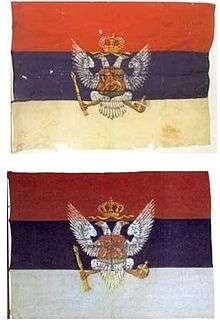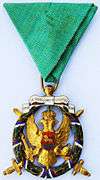Greens (Montenegro)

The Greens (Montenegrin: Zelenaši/Зеленаши) were a group of Montenegrin nationalists which originated from the membership of True People's Party, most notable for instigating the Christmas Uprising of 1919 in an attempt to prevent the annexation of Montenegro into the unitary Kingdom of Yugoslavia. Greens were supporters of the Petrović-Njegoš dynasty, which was dethroned after the World War I, and fought for the establishment of Montenegro as either an independent state, or a federal unit within the Yugoslav federation. Following the defeat in Christmas uprising, Greens continued with guerrilla warfare until 1929. The motto of the movement, as inscribed on their flag, was "For the Right, Honour and Freedom of Montenegro".
During World War II, Greens were activated once again under the leadership of Krsto Popović in an attempt to re-establish the Kingdom of Montenegro as an Axis client state. [1]
Characteristics
The Greens (Zelenaši) movement was originally founded in 1918 in Montenegro by the opponents of Montenegrin unification with Kingdom of Serbia and integration into the newly established Kingdom of Yugoslavia, when they supported the Montenegrin House of Petrović-Njegoš of Montenegro over the Serbian House of Karađorđević. After the unsuccesful armed rebellion against the unification known as the Christmas Uprising, the Greens continued guerrilla resistance until 1929, while their political activity was based on opposition to the mode and manner in which the south Slavic unification was implemented, resulting in the disappearance of Montenegro as a political entity. The Greens insisted that Montenegrins and Serbs were different peoples, and they continued to push for Montenegrin autonomy within the Yugoslav state.[2] The Greens were not opposed to joining the emerging Yugoslav state, but wanted “to be able to join it as Montenegro, and not as a prefecture of Serbia, as free Montenegrins, in line with the tradition and history of their country, and not yes-men of Belgrade, to join it on equal footing with Slovenes, Croats and very Serbs”[3], i.e. on conditions of equality and preservation of Montenegrin identity.[4] Despite that, they declared themselves as Serbs.[5]
The Greens drew their membership from the highland tribes (Moračani, Piperi, and Rovci), the Katun clans (Bjelice, Cetinje, Čevo, and Cuce), and the Herzegovinian tribes (Nikšići and Rudinjani).[6] Notable leaders of the Greens included Krsto Zrnov Popović, Jovan S. Plamenac and Novica Radović.
Greens re-gathered during World War II, under the command of Krsto Zrnov Popović who in turn acted under the auspices of fascist Italy. They were organized into a military unit called the Lovćen Brigade featuring four brigades that participated in the chaotic civil war raging on the ground in Montenegro and whose military activity was mostly directed against the communist Partisans. After their military defeat, most of the surviving Greens members joined the Partisans, with some joining the Ustaše and a minority joining the Chetniks.
Name
The name of the Greens derives from the green voting cards that were used by the opponents of unification with Serbia used at the ad hoc Podgorica Assembly in 1918.
History
Christmas Uprising

The Greens opposed the unification of the Kingdom of Montenegro with the Kingdom of Serbia under the House of Karađorđević. With support from Italy, the Greens organised an uprising in 1919 with the aim of bringing the House of Petrović-Njegoš back to the Montenegrin throne. The rebellion failed and the rebels fled to Italy. Krsto Zrnov Popović, Jovan Plamenac and Novica Radović led the uprising, along with Commander Savo Čelebić and Captain Đuro Drašković.
Interwar period
After the unsuccessful uprising, the Greens returned to Montenegro, starting a guerrilla warfare against the Serbian hegemony. The core of the revolt was subdued in 1922-1923, but low-level guerrilla resistance continued in the mountains and highlands for several more years. In 1922, a number of leaders of the Greens founded the Montenegrin Federalist Party, shifting from organised armed resistance to political struggle.
By 1926, most remaining forms of armed resistance ended. However, a few groups continued engaging in skirmishes until 1929. Reportedly, the last rebel to lay down his arms did so on the promise that he would receive a sabre and medal from King Alexander I of Yugoslavia.
World War II: restoration and dissolution
In World War II, the Greens were organized yet again in Montenegro under the command of the Fascist Italy. Drljević was put in power and proclaimed the re-establishment of the Kingdom of Montenegro, but was immediately ousted by the 13 July uprising of local Partisans and Chetniks. Among the Montenegrin federalists, Krsto Zrnov Popović returned from exile in Italy to attempt to lead the Greens. The Greens' forces were called the Lovćen Brigade. Soon, they were disorganized and one group of Greens joined the Partisans, while another joined the Ustaše and some joined the Chetniks.
After the Partisan victory in 1945, many leaders of the Greens were killed as the collaborators of the Italian occupation: the same Popović was murdered in 1947. At the same time, the Communists were killing many potential opponents all over Yugoslavia. This marked the end of the Greens.
Order of Freedom of Montenegro

The Order of Freedom of Montenegro was issued by the exiled King Nikola in January 1919. This order was mainly dedicated to the Greens.
Notes
- ↑ Roberts 1987, p. 24.
- ↑ Hall, Richard C. (2014). War in the Balkans: An Encyclopedic History from the Fall of the Ottoman Empire to the Breakup of Yugoslavia. ABC-CLIO. p. 134. Retrieved 2 October 2018.
- ↑ Petersen, Roger D. (2011). Western Intervention in the Balkans: The Strategic Use of Emotion in Conflict. Cambridge University Press. p. 273. Retrieved 2 October 2018.
- ↑ Banac, Ivo (March 1988). The national question in Yugoslavia: origins, history, politics. Cornell University Press. p. 288. ISBN 9780801494932. Retrieved 17 November 2011.
- ↑ Banac, Ivo (1992), Protiv straha : članci, izjave i javni nastupi, 1987-1992 (in Croatian), Zagreb: Slon, p. 14, OCLC 29027519, retrieved 12 December 2011,
Posebno je zanimljivo da su se i »zelenaši«,...., nacionalno smatrali Srbima" [it is especially interesting that Greens also ... declared themselves as Serbs]
- ↑ Banac, Ivo (March 1988). The national question in Yugoslavia: origins, history, politics. Cornell University Press. p. 285. ISBN 9780801494932. Retrieved 17 November 2011.
References
- Roberts, Walter R. (1987). Tito, Mihailović and the Allies: 1941–1945. New Brunswick, New Jersey: Duke University Press. ISBN 978-0-8223-0773-0.